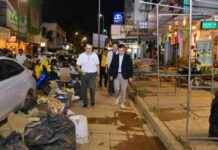Senate Rejects Resolution to Establish Flood Solutions Committee
In a recent session of the Thai Senate, a resolution to establish a committee to address flood solutions was overturned, sparking outrage among the public. The resolution, proposed by Dr. Serenee Anilbol, aimed to set up a committee to study and implement urgent flood mitigation measures. However, the resolution faced opposition from some members of the Senate, including General Suthep, who requested a quota for the representation of the Big House faction within the committee.
The debate within the Senate became heated when Dr. Prem Sakdipiyarat confronted General Suthep, questioning the need for further study when action was required immediately. Dr. Prem emphasized the importance of addressing the plight of farmers who have been severely affected by flooding. He expressed his frustration at the lack of decisive action by the government in tackling the recurring issue of floods.
Urgent Action Needed to Address Flooding Crisis
The issue of flooding in Thailand is a pressing concern that requires immediate attention. Despite various governments providing relief and compensation to affected farmers in the past, the root cause of the problem remains unresolved. The call for the establishment of a flood solutions committee is a step in the right direction towards finding long-term and sustainable solutions to mitigate the impact of floods.
The recurring nature of floods in Thailand highlights the need for a comprehensive and systematic approach to address the issue. While short-term measures such as financial aid to affected farmers are important, they are not enough to address the underlying problems that lead to flooding. By setting up a committee dedicated to studying flood solutions, the government can work towards developing strategies that will effectively reduce the risk of flooding in the future.
Challenges and Criticisms Surrounding the Resolution
The rejection of the resolution to establish a flood solutions committee has raised concerns among various stakeholders, including farmers, environmentalists, and concerned citizens. The decision to overturn the resolution has been met with criticism, with many questioning the motives behind the Senate’s actions.
One of the main criticisms of the Senate’s decision is the lack of consideration for the immediate needs of farmers who are suffering due to flooding. The failure to prioritize the well-being of those most affected by the crisis reflects a disconnect between the government and the people it is meant to serve. Additionally, the political maneuvering and power struggles within the Senate have further complicated efforts to address the issue effectively.
The reluctance of some Senate members to support the establishment of a flood solutions committee highlights a broader issue of political will and accountability. Without a unified and focused approach to tackling the problem of flooding, Thailand risks facing continued devastation and loss due to natural disasters.
Despite the challenges and criticisms surrounding the resolution, there is still hope that urgent action can be taken to address the flooding crisis. By engaging in constructive dialogue and working together towards a common goal, the government and relevant stakeholders can find innovative and sustainable solutions to mitigate the impact of floods in Thailand.
In conclusion, the rejection of the resolution to establish a flood solutions committee by the Thai Senate highlights the urgent need for decisive action to address the ongoing crisis. By prioritizing the well-being of farmers and vulnerable communities, the government can demonstrate its commitment to serving the interests of the people. It is crucial for all stakeholders to come together and work towards finding long-term solutions that will protect the country from the devastating effects of flooding.



















